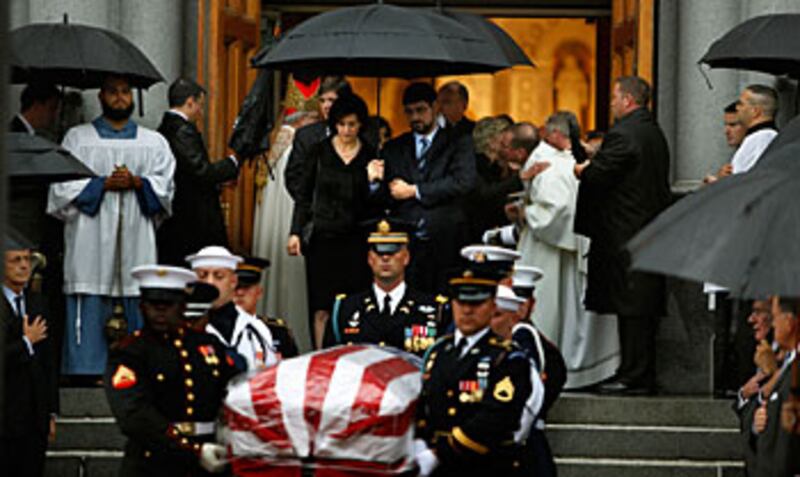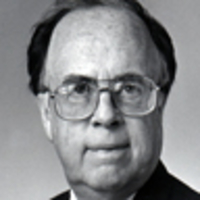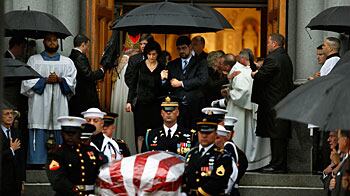
Public celebrations about a great life are inevitably largely about the past, and with buses and traffic signs in Boston proclaiming “Thanks Ted,” the goodbye to Edward M. Kennedy is no exception. But the future is part of the agenda, too, both at last night’s celebration of his life and again at today's funeral.
Friday night there were promises from Democratic Senators Chris Dodd and John Kerry to pass the health-care legislation Kennedy wanted for 40 years. (Republicans John McCain and Orrin Hatch talked instead about the joys and frustrations of negotiating with him.) And there was a fiery promise from the late senator's nephew, Joseph P. Kennedy II, that his uncle's message, about a sailing race but really for life, was, "Don't ever, ever, ever, ever give up," that sounded as if the former congressman might seek the family seat in the senate.
Former Iowa Senator John Culver told of being assured by Kennedy that “there’s nothing to it” when he enlisted for a sailing race, and then being seasick, rain-soaked, and chilled for 24 hours.
Without knowing what President Obama and others will say today, one cannot predict the balance between past and future. But the history of the church where Senator Kennedy went to pray as his daughter, Kara Kennedy Allen, fought lung cancer in 2003, suggests a theme for the servce. The Basilica of Our Lady of Perpetual Help is a church where the faithful come to pray for cures. Beneath an icon of Mary, there are vases of crutches and canes to symbolize those cures, and silver plaques commemorating two cures in the 1880s, when the church was known as the "Lourdes in the Land of the Puritans." It would be an obvious opportunity missed if no one spoke of the need to cure the nation's health-care system, or at least to find a cure for what ails the president's embattled legislation.
• The Daily Beast's Complete Kennedy Coverage: Tributes, Photos, and Videos Friday night's event commemorated both past and future, again beginning with the site. It was held at the John F. Kennedy Library, in an auditorium where Senator Kennedy used to hold dinners—shadow state dinners, really—to honor foreign leaders such as Czech President Vaclav Havel, Pakistani Prime Minister Benazir Bhutto, Canadian Prime Minister Brian Mulroney, and a variety of Irish politicians including Mary Robinson and John Hume. But the library is next door to a plot of land where the Edward M. Kennedy Institute for the Senate will rise. Boston Mayor Thomas Menino said it would provide "another lasting legacy of the Kennedys in Boston." Contributions to the project, budgeted at $100 million, have picked up since the senator's death said its CEO, Peter Meade, and the public has been invited to contribute instead of sending flowers.
The night's speeches—a total of three-and-a-half hours that left the audience scrambling for cars in a downpour that is a foretaste of Tropical Storm Danny's promises for today—alternated between solemn assessments of Kennedy's merits and accounts of his misadventures. The most entertaining of the latter came from John Culver, a former senator from Iowa and a college chum of Kennedy's. He told of being assured by Kennedy that "there's nothing to it" when he enlisted for a sailing race, and then being seasick, rain-soaked, and chilled for 24 hours while Kennedy shouted orders. "We were being bounced all over," said Culver, "and it's all my fault?" And Dodd told of a phone call from Kennedy earlier this month, when he was in a recovery room after prostate surgery. He said Kennedy told him, "Between undergoing prostate surgery and holding town-hall meetings, you made the right choice."
Dodd turned serious then, listing some of the laws Kennedy sponsored in education, health and other areas, and compared him with his brothers: "John Fitzgerald Kennedy inspired America. Robert F. Kennedy challenged America. Our Teddy changed America."
Vice President Joe Biden told of how Kennedy "took on the role of being my elder brother" when he was in despair after his wife and daughter were killed and his sons gravely injured in a car crash just after he was first elected to the Senate. Kennedy urged him, again and again, to give the Senate a chance. He got him committee assignments, encouraged him to get involved, and then, when Biden suffered from brain aneurysms in 1988, took over his committee for him for months until arriving unexpectedly in Delaware to tell Biden he was needed and it was time to return.
Then Biden turned to the dozens of young Kennedys in the hall and said pundits were making a mistake when they said the era of Kennedy was over. "Because of you," he said, "the dream still lives."
The evening's final speaker made the same point. His niece, Caroline Kennedy, said, "We are the ones who have to do all the things he would have done, for ourselves and for our country."
Then the audience stood and all sang a favorite song of Kennedy's: "When Irish Eyes Are Smiling."
Adam Clymer is a former chief Washington correspondent of The New York Times and author of Edward M. Kennedy: A Biography.





